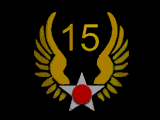|
NARRATIVE
HISTORY COVERING PERIOD OF NOV. 26, 1943 – JAN. 2, 1944
Rain
was a novelty in Alamogordo. We had 3 rains in 90 days. Snow was practically
unknown. But on November 26, the day we left for our Port of Embarkation, it
rained and snowed in buckets-full. It was a bleak, dreary day, the Alamogordo
sand was turned to mud; clothes, equipment and men were saturated with the cold
drenching rain, Trucks were busy hurling equipment to the station – everything
was happening in a hurry. The squadron was divided into sections, with leaders
for each section to speed up movement. At about 1400, the men were loaded on
the trucks; officers in charge called roll, and off we went to the station.
Later
in the day, the cold rain turned into a wet snow. The train had not arrived, so
the men were dispersed in areas around the station in order to stay under cover
as much as possible.
After
hours of waiting, the "722nd Special" pulled into the station amidst
the cheers of the waiting soldiers. All climbed on board. The rumbling of
wheels along the track was a welcome sound indeed. Comfortably seated, a tired
722nd waited for the porters to make up the bunks. The rhythmical
snores of sleeping soldiers evinced the end of a busy day.
The
time aboard the train was spent playing cards, dice and all other games
imaginable. The men were given a few minutes of close order drill and sitting
up exercises on station platforms along the way. Food was an item of great
concern, but we fared well on the meals provided by the company.
The
trip seemed endless; through New Mexico, Texas, Oklahoma, Tennessee, Georgia,
and up the East Coast. Finally the train reached the Port of Embarkation,
Hampton Roads, Virginia.
Hampton
Roads was quite different from Alamogordo, tall beautiful trees, green grass,
clumps of bushes, dark rich dirt and the smell of the fresh Eastern air, things
unseen in Alamogordo. The two places were in direct contrast to one another.
The
days spent in Hampton Roads, Virginia, were busy ones. Shortages of equipment
were made up, lectures on censorship were given, calls to loved ones at home
were made. The four days spent there passed altogether too fast.
It
was still dark when we began to board the trains that took us to the docks. We
unloaded to the familiar songs: "Over There", "There's a Long, Long Trail
Awinding", "K-K-Katy". As we boarded the ferry, the army band played the Air
Corps Song.
The
ferry steamed down the Chesapeake on its way to Norfolk, Virginia. The Red
Cross was on hand with coffee and doughnuts that no one passed up.
A
few hours later, we arrived at Norfolk and disembarked from the fatty only to
re-embark on what was to be our "home" for the next few weeks, the Merchant
marine Victory Ship, "S.S. Bret Harte".
The
"Bret Harte" raised anchor the night of December 4th and for the
next two days steered a course to enable it to catch up with the convoy. Before
the convoy was reached, there was considerable concern on board, but when the
navy destroyers and aircraft carrier were sighted all worry disappeared.
There
were many idle hours aboard ship but the major part of the time was spent in
poker and dice. Evening entertainment included boxing bouts and variety shows.
Christmas
Eve was spent docked at Bizerta Harbor, North Africa, awaiting further orders.
A Christmas Eve variety program was held, followed by a combined Catholic and
Protestant Church Service. Many a soldier shed a tear that night. The
realization of being overseas and away from his loved ones was accentuated on
that night of nights. The same evening the ship raised anchor and set out
towards the coast of Sicily. Christmas Dinner, which by the way, was very well
prepared, was eaten with the coast of Sicily in sight.
At
last, on December 26th to be exact, the convoy steamed into the
harbor of Naples. The following day the troops were unloaded and taken to the
staging area in Bagnoli. The men were quartered in a building well ventilated
by bomb bursts and concussions. Cold marble floors were substituted for beds
and cold "C" rations were the substitute for meals. During the four days spent
there, the men were permitted to visit the Town of Bagnoli, where they
bargained with the Italians, for various items using cigarettes as a means of
exchange.
On
January 2, 1944, equipment was packed and loaded, and the convoy of twenty
trucks sped on its way through the winding roads of Italy to its new "home",
Manduria.
Jules
J. L. Hessen
2nd
Lt., Air Corps
Squadron
Historian
|



